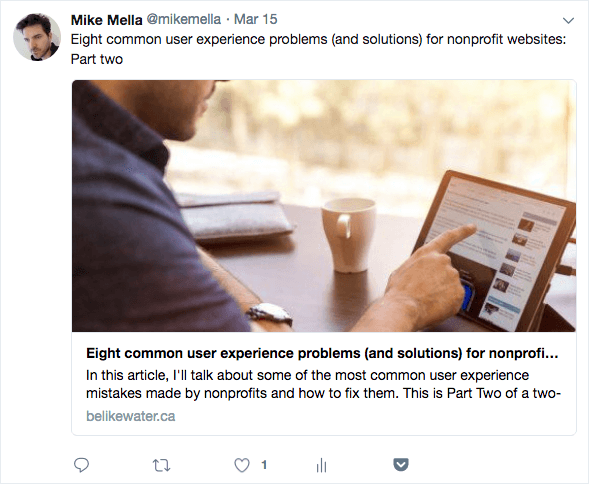
Searching for meaning? Start by adding meaning to your website content.
When an article from your nonprofit's website is shared on Twitter or Facebook, what does it look like? How about when your website appears in Google search results? There are two types of code that you can add to your website that will improve the way your shares and search results look, and provide more context about your content. These are called Metadata and Structured Data, respectively.
Check out these two tweets. Which do you find more engaging?:


The second one looks better because the page is enhanced with Twitter Metadata code that promotes the tweet to a "Twitter card." Similar metadata exists for Facebook and other social media platforms. Social media shares that draw the eye and provide more information about the article are more likely to get clicked than those that don't.
To check how your content looks when shared on Facebook, paste the URL of one of your pages into Facebook's Sharing Debugger. If it gives you a lot of errors, or if the preview doesn't look the way you want it to, there may be ways to improve it.
Twitter's Card Validator is a similar tool that checks how your article will look when shared on Twitter.
The second type of code you can add to your site will improve the way your pages communicate with search engines. Structured Data tells Google what kind of content is on a webpage. You can tell Google that your blog posts are articles. You can identify your staff as people. Why is this important? Google can leverage Structured Data to rank your pages more accurately in search results.
Depending on the type of content your website contains, structured data can also produce “rich cards” - search results that are enhanced with images, ratings, reviews, and other content from your page.
Rich cards are a new Search result format building on the success of rich snippets. Rich cards use structured markup to display content in an even more engaging and visual format, with a focus on providing a better mobile user experience.
Google
And yes, Google has a Structured Data Testing Tool that lets you check how your content will be understood by their search engine. I've marked up my own About page with Structured Data, and here's how it looks to Google:

Take a look at how your content appears on social networks and in search results. If you'd like to improve that, you probably can.
Have I made you consider a viewpoint you hadn't before? Or do you and I think alike? Either way, maybe we should work together?